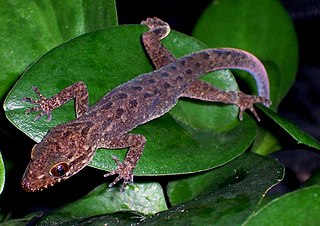
Cyrtodactylus is a diverse genus of Asian geckos, commonly known as bent-toed geckos, bow-fingered geckos, and forest geckos. The genus has 361 described species as of 2024, which makes it the largest of all gecko genera.
Cyrtodactylus aaroni is a species of gecko, a lizard in the family Gekkonidae. The species is endemic to western Papua New Guinea, Indonesia.
Cyrtodactylus arcanus is a species of gecko that is endemic to Papua New Guinea.
Cyrtodactylus capreoloides is a species of gecko that is endemic to Papua New Guinea.
The Derongo bow-fingered gecko is a species of gecko that is endemic to Papua New Guinea.
Cyrtodactylus epiroticus is a species of gecko that is endemic to Papua New Guinea.

Cyrtodactylus irianjayaensis is a species of gecko that is endemic to Papua New Guinea.
Cyrtodactylus klugei is a species of gecko, a lizard in the family Gekkonidae. The species is endemic to Papua New Guinea.

Boulenger's bow-fingered gecko is a species of gecko, a lizard in the family Gekkonidae. The species is endemic to Papua New Guinea.

The ring-tailed gecko is a species of gecko that is endemic to the Louisiade Archipelago of Papua New Guinea.
Cyrtodactylus medioclivus is a species of gecko that is endemic to Papua New Guinea.

Cyrtodactylus mimikanus, also known as the false bow-fingered gecko, the Mimika bow-fingered gecko, or Mimika bent-toed gecko, is a species of gecko that is endemic to Papua New Guinea.
Cyrtodactylus minor is a species of gecko that is endemic to Papua New Guinea.
Cyrtodactylus murua is a species of gecko that is endemic to Papua New Guinea.
The Papua bow-fingered gecko is a species of gecko that is endemic to southern Papua New Guinea.
Cyrtodactylus robustus is a species of gecko that is endemic to Rossel Island in Papua New Guinea.
De Rooij's bow-fingered gecko or De Rooij's bent-toed gecko is a species of gecko. It is endemic to New Guinea and occurs in both Papua New Guinea and Western New Guinea (Indonesia).
Cyrtodactylus serratus is a species of gecko that is endemic to Papua New Guinea, specifically the south-west part of the country. It is a rather common species, living mostly in the canopy of forests. It is found in elevations of 100 meters to 1,400 meters.
Cyrtodactylus tripartitus is a species of gecko that is endemic to Papua New Guinea.
Vankampen's gecko is a species of lizard in the family Gekkonidae. The species is endemic to New Guinea.






